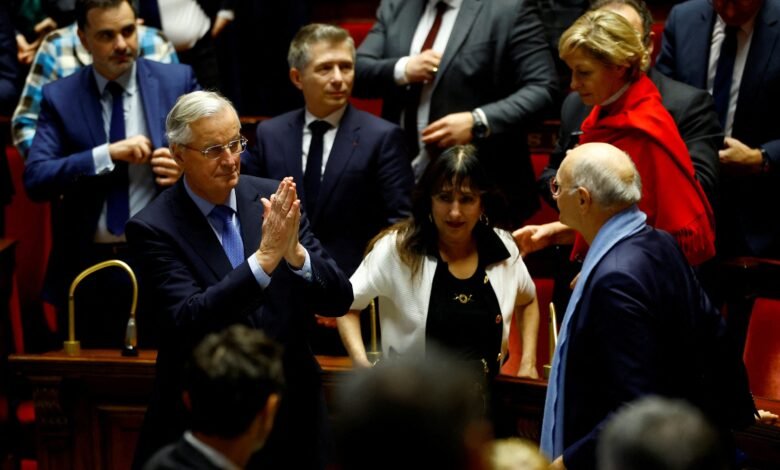French Economy Under Political Threat

France is currently facing a severe political crisis after Prime Minister Michel Barnier’s government was ousted by a no-confidence vote, confirming what many had seen as inevitable. Barnier, with 331 votes against him, was forced to resign, plunging the country into instability. This political vacuum is reminiscent of the chaos that characterized the Fourth Republic and reveals the vulnerabilities of the Fifth Republic’s system, which is designed for a strong president with a parliamentary majority. The current situation highlights the dysfunctionality of the system when that balance is disrupted. As a result, France may be heading towards legislative elections in June 2025, and potentially even a presidential race, as Macron’s authority is weakened.
Temporary Government and Budget Roll-Over
In the immediate term, the government will function under a caretaker administration. This means that no new laws or major reforms will be implemented. Instead, a special law will roll over the 2024 budget, allowing the government to make necessary adjustments like the annual adjustment of income tax brackets, which will prevent tax increases that could burden millions of households. However, this stopgap measure means that no significant fiscal reforms or new public spending programs will be launched. The new government, once appointed, will only be able to manage day-to-day operations and address urgent concerns, but will lack the mandate or the political stability to push through any major changes.
Financial Impact and Economic Challenges
Financially, while the budget rollover will lead to a slight reduction in the deficit, this is still insufficient to meet the targets set by the European Union. The country’s debt situation remains precarious, and the gap in interest rates between French and German government bonds may continue to widen, though it is unlikely to lead to a full-scale financial crisis due to the protection offered by the eurozone. Despite this, the political paralysis will have real consequences for the French economy. Growth is expected to slow further, which will exacerbate challenges in the labor market, and the ongoing instability will put additional strain on public finances. The combination of sluggish growth and a widening deficit will make it harder for France to meet its long-term fiscal commitments.
Investment Outlook: Uncertainty and Caution
From an investment perspective, the lack of a budget and the abandonment of proposed tax increases by the left-wing coalition are seen as relatively positive for savers. There will be no immediate rise in income taxes or changes to the flat tax (PFU), meaning returns for investors will remain protected in the short term. The expectation of decreasing interest rates across the eurozone will also likely support investment conditions in the broader European market. However, French companies—particularly those dependent on the domestic market—will continue to face challenges, with their stock prices likely pressured by the ongoing political and economic uncertainty. As a result, the investment environment will likely remain one of caution and volatility, as markets wait to see how the political crisis is resolved.
The Search for a New Prime Minister
As Macron now faces the task of appointing a new prime minister, the uncertainty surrounding this process adds another layer of unpredictability. Macron has a history of making unexpected political appointments, and some names are already circulating in Paris as potential candidates to take over the role. Among the top contenders are Bernard Cazeneuve, a former prime minister who could help fracture the left-wing opposition; Sébastien Lecornu, a Macron loyalist from the center-right Republicans; François Bayrou, a centrist and key Macron ally; and Jean Castex, a former prime minister known for his pragmatic leadership style. Regardless of the choice, the new prime minister will inherit a government with limited political capital, unable to introduce the bold reforms necessary to address France’s fiscal and economic challenges. In the meantime, the lack of a clear leadership direction will continue to hold back any meaningful progress.
Macron’s Resolve and France’s Future
Le Pen, leader of the far-right National Rally, has already weighed in on Macron’s future, suggesting that the president must decide whether his pride is worth sacrificing the future of the country. Despite her criticism, Macron remains determined to fulfill his mandate, asserting that he intends to serve out his full term until 2027. This stance is likely to be tested, however, as the political vacuum continues to grow, and his ability to govern effectively comes under increasing pressure.
Conclusion: Uncertainty Ahead for France
Overall, this period of political paralysis in France has serious implications for both the domestic economy and financial markets. While the immediate risks of a financial crisis are low, the prolonged uncertainty is likely to weigh heavily on the economy, slow growth, and reduce investor confidence. With the next elections in 2025 still far off, the country faces a prolonged period of political instability that will be challenging for both policymakers and the public. Investors, meanwhile, will remain cautious, navigating a period of uncertainty until a more stable political environment emerges.
Investors continue to be quite complacent with the French bond market : despite yesterday’s event, the French 10-year yield is down by 0.55% and the spread between French and German 10-year bonds is declining by 4.28%, today. The CAC 40 seems well oriented towards the 6600- 6950 support area, though. Source : xStation.
By Antoine Andreani, Head of Research at XTB France.
The material on this page does not constitute financial advice and does not take into account your level of understanding, investment objectives, financial situation or any other specific needs. All information provided, including opinions, market research, mathematical results and technical analyzes published on the Website or transmitted To you by other means, it is provided for information purposes only and should in no way be construed as an offer or solicitation for a transaction in any financial instrument, nor should the information provided be construed as advice of a legal or financial nature on which any investment decisions you make should be based exclusively To your level of understanding, investment objectives, financial situation, or other specific needs, any decision to act on the information published on the Website or sent to you by other means is entirely at your own risk if you In doubt or unsure about your understanding of a particular product, instrument, service or transaction, you should seek professional or legal advice before trading. Investing in CFDs carries a high level of risk, as they are leveraged products and have small movements Often the market can result in much larger movements in the value of your investment, and this can work against you or in your favor. Please ensure you fully understand the risks involved, taking into account investments objectives and level of experience, before trading and, if necessary, seek independent advice.




